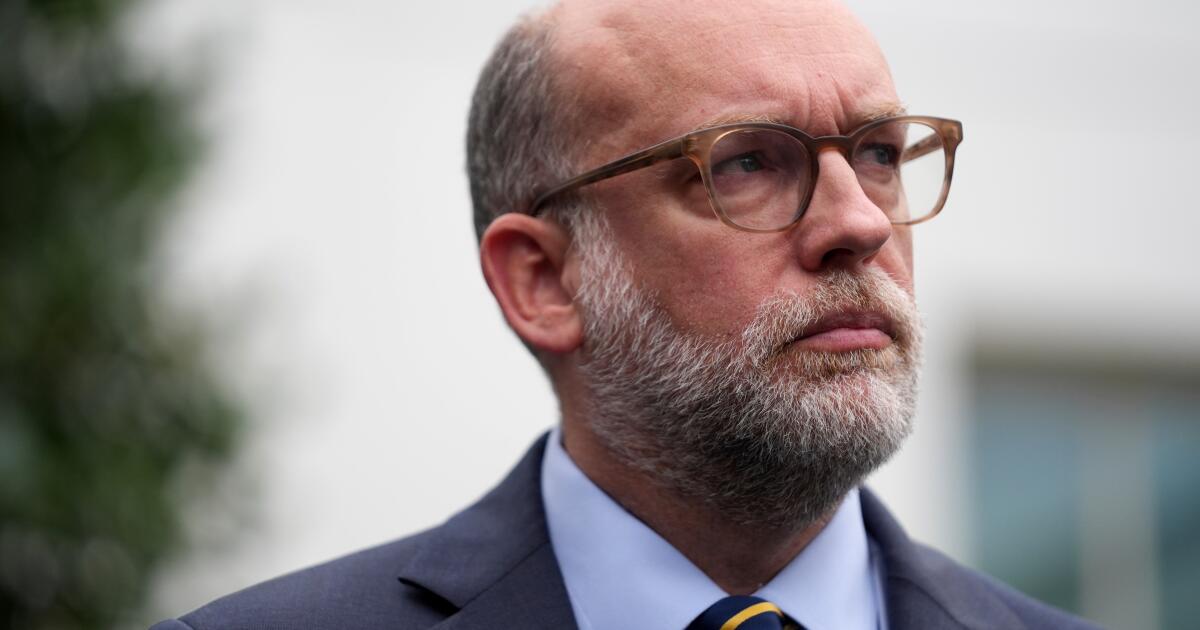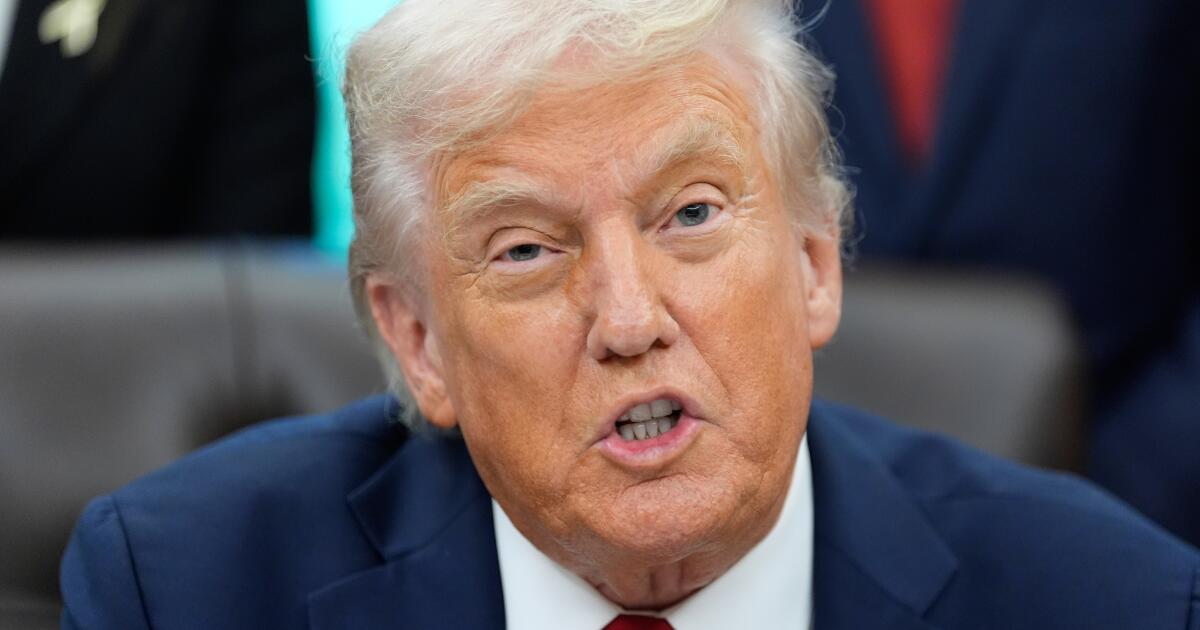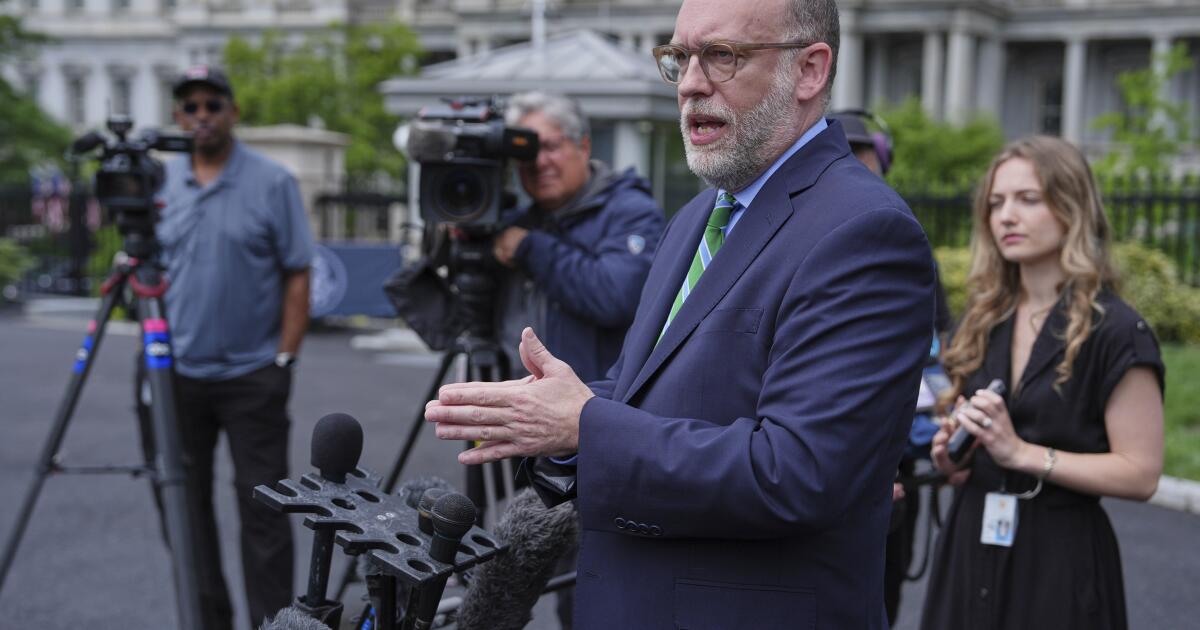Trump and budget chief Vought are making this a government shutdown unlike any other
WASHINGTON — President Trump is making this government shutdown unlike any the country has ever seen, enabling his budget office a rare authority to pick winners and losers — who gets paid or fired — in an unprecedented restructuring across the federal workforce.
As the shutdown enters its third week, the Office and Management and Budget said Tuesday it’s preparing to “batten down the hatches” with more reductions in force to come. The president calls budget chief Russ Vought the “grim reaper” who’s seized on the opportunity to fund Trump’s priorities, paying the military while slashing employees in health, education, the sciences and other areas with actions that have been criticized as illegal and are facing court challenges.
“Pay the troops, pay law enforcement, continue the RIFs, and wait,” OMB said in a social media post.
With Congress at a standstill — the Republican-led House refusing to return to session and the Senate stuck in a loop of failed votes to reopen government as Democrats demand health care funds — the White House’s budget office quickly filled the void.
From Project 2025 to the White House
Vought, a chief architect of the conservative Project 2025 policy book, is reshaping the size and scope of federal government in ways similar to those envisioned in the blueprint. It is exactly what certain lawmakers, particularly Democrats, feared if Congress failed to fund the government.
Trump’s priorities — supporting the military and pursuing his mass deportation agenda — have been kept largely uninterrupted, despite the closures. But employees in health, education, the sciences and other federal departments are among those being laid off. As many as 750,000 workers are being furloughed.
“Donald Trump and Russ Vought and all of their cronies are using this moment to terrorize these patriots,” said Sen. Chris Van Hollen, D-Md., standing with federal workers Tuesday outside the White House budget office.
Van Hollen said it’s “a big fat lie” when Trump and his budget director say that the shutdown is making them fire federal workers. “It is also illegal and we will see them in court,” Van Hollen said.
Shutdown grinds into a third week
Now on its 14th day, the federal closure is quickly becoming among the longest government shutdowns. Congress failed to meet the Oct. 1 deadline to pass the annual appropriations bills needed to fund the government as the Democrats demanded a deal to preserve expiring health care funds that provide subsidies for people to purchase insurance through the Affordable Care Act.
House Speaker Mike Johnson on Tuesday said he has nothing to negotiate with the Democrats until they vote to reopen the government.
The Republican speaker welcomed OMB’s latest actions to pay some workers and fire others.
“They have every right to move the funds around,” Johnson said at a press conference at the Capitol. If the Democrats want to challenge the Trump administration in court, Johnson said, “bring it.”
Typically, federal workers are furloughed during a lapse in funding, traditionally with back pay once government funding is restored. But Vought’s budget office announced late last week the reductions in forces had begun. More than 4,000 workers received layoff notices over the weekend.
Military pay, deportations on track
At the same time, Trump instructed the military to find money to ensure service personnel wouldn’t miss paychecks this week. The Pentagon said over the weekend it was able to tap $8 billion in unused research and development funds to make payroll.
On Tuesday, Homeland Security Secretary Kristi Noem said her agency was relying on Trump’s big tax cuts law for funding to make sure members of the Coast Guard, which falls under the department, are also paid.
“We at DHS worked out an innovative solution to make sure that didn’t happen,” Noem said in a statement. Thanks to “the One Big Beautiful Bill,” she said, “the brave men and women of the US Coast Guard will not miss a paycheck this week.”
In past shutdowns, the Office of Management and Budget has overseen agency plans during the lapse in federal fundings, ensuring which workers are essential and remain on the job. Vought, however, has taken his role further by speaking openly about his plans to go after the federal workforce.
As agencies started making their shutdown plans, Vought’s OMB encouraged department heads to consider reductions in force, an unheard of action. The budget office’s general counsel, Mark Paoletta suggested in a draft memo that the workforce may not be automatically eligible for back pay once government reopens.
‘Grim reaper’ replaces Elon Musk’s chainsaw
Trump posted an AI-generated video last week that portrayed Vought dressed with cloak and dagger, against the backdrop of the classic rock staple “(Don’t Fear) The Reaper.”
“Every authoritarian leader has had his grim reaper. Russell Vought is Donald Trump’s,” said Rep. Steny Hoyer, the senior Democrat from Maryland.
Hoyer compared the budget chief to billionaire Elon Musk wielding a chainsaw earlier this year as part of the Department of Government Efficiency’s slashing of the workforce “Vought swings his scythe through the federal government as thoughtlessly,” he said.
In many ways, the “Big, Beautiful Bill, Act” as the law is commonly called, gives the White House a vast new allotment of federal funding for its priority projects, separate from the regular appropriations process in Congress.
The package unleashed some $175 billion for the Pentagon, including for the Golden Dome missile shield and other priority projects, and another $175 million to Homeland Security largely for Trump’s mass deportation agenda. It also included extra funds for Vought’s work at OMB.
Trump’s big bill provides billions
Certain funds from the “big bill” are available to be used during the shutdown, according to the nonpartisan Congressional Budget Office.
“The Administration also could decide to use mandatory funding provided in the 2025 reconciliation act or other sources of mandatory funding to continue activities financed by those direct appropriations at various agencies,” according to CBO.
The CBO cited the Department of Defense, the Department of the Treasury, the Department of Homeland Security, and the Office of Management and Budget as among those that received eligible funds under the law..
Mascaro writes for the Associated Press. AP writers Kevin Freking, Stephen Groves and Mary Clare Jalonick contributed to this report.



